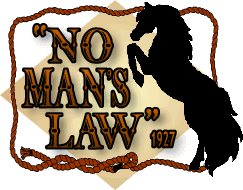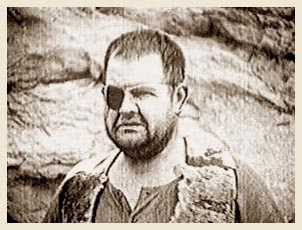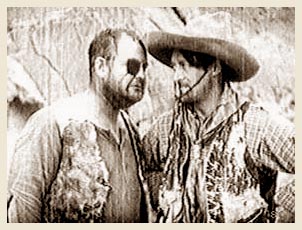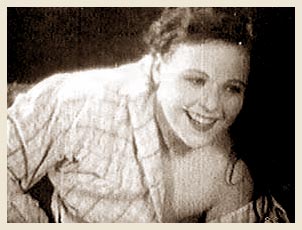

Hal Roach Studios, Inc.
Distributed by Pathé Exchange
Cast: Oliver Hardy (Sharkey Nye), Theodore von Eltz (Spider O'Day), Barbara Kent (Toby Belcher), James Finlayson (Jake Belcher), Rex, the King of the Wild Horses (himself)
Sharkey Nye and Spider O'Day are two shady characters who
are riding together but are very distrustful of each other. Spider
is especially wary since there is a $5,000 reward on him for murder
and various other crimes. They happen upon the mine of Jake Belcher
and determine to take it. However, they decide to make Jake's
death look like an accident and cause a cave in, that, unfortunately
for them, does not kill him. Just as they are about to finish
the job, Toby, Jake's foster daughter, and the wild horse, Rex,
come up. The two men pretend they are there to help Jake. Back
in the cabin that night, both men lust after Toby. She likes Spider,
and when Sharkey discovers the two of them  talking,
he and Spider fight. Sharkey eventually shoots Spider, and it's
up to Rex to save the day.
talking,
he and Spider fight. Sharkey eventually shoots Spider, and it's
up to Rex to save the day.
Hal Roach Studios, along with Mack Sennett, created the best short comedies in movie history. That's what Hal Roach is remembered for. However, he did produce an occasional feature, such as "The Devil Horse," a 1926 western with Yakima Canutt, and the 1927 "No Man's Law." There's nothing unusual about that, but, at least for the silent film fan who has been exposed to Laurel and Hardy and the other Hal Roach comedies through the years, what is unusual is a western drama with Oliver Hardy as the bad buy and Jimmy Finlayson playing a straight role.
"No Man's Law" (1927) is a good entertainment and certainly holds its own against other westerns of the period. The story is a fairly strong one and was written by well-known comedy director F. Richard Jones. Jones directed for Mack Sennett with four Mabel Normand features and Douglas Fairbanks' 1927 "The Gaucho" to his credit. It is not the traditional "shoot 'em up" western, but more of a character drama about what happens when fate brings these four people together.
The film is considered a Rex, the King of the Wild Horses, feature, and certainly the steed's role is not incidental, but the interaction of at least three of the four main characters is what demands our attention for the film's 55-minute run.
Hardy is Sharkey Nye, who has a $5,000 reward on his head for murdering a prospector. He has a patch over one eye, is unshaven, and wears a dirty, torn shirt with a vest. The mild-mannered simpleton from the Laurel and Hardy comedies does, indeed, look, and act, imposing.
His cohort is Spider O'Day, played by Theodore von Eltz,
a veteran of silent films since 1915 with such features as "Manslaughter
(1922) and "Bardelys the Magnificent" (1926) to his
credit. He went on to a have a very busy career throughout the
thirties and forties with roles in some of the top features from
those two decades. In "No Man's Law," however, he's
described as a "Vagabond - Soldier of Fortune - too bad  to
be a Good Man - not bad enough to be a Bad Man."
to
be a Good Man - not bad enough to be a Bad Man."
Jimmy Finlayson, better known as "Fin" with the frustrated, one-eyed squint from so many of the Hal Roach comedies, is Jake Belcher, a miner who has "dug more holes and found less gold than any man in Death Valley." His foster daughter is the lovely Barbara Kent, who was a very young-looking 21 years of age when the film was made. "No Man's Law" was only her third feature.
While Sharkey and Spider are looking over Belcher's mine, Sharkey notices Rex and goes up on higher ground to get a better look at the beautiful horse. Before leaving, however, he notices a nude Toby diving from a cliff into a pond. Unable to believe his eyes, he goes in for a closer look, and, sure enough, there's the lovely, unclothed, young girl (she's actually wearing a flesh colored body suit for the movie) frolicking about in the water. Especially during this segment, we must give Oliver Hardy credit for his ability to put across the bad guy, even throwing in a little disgust for good measure. As Toby notices the intruder, he grins devilishly and begins to take off his vest as if to join her. Then he laughs at the fear he has caused and leans back upon a rock to continue leering and grinning. Then he notices her clothes, and, because they are a man's shirt and pants, he points to her and then the clothes asking if they are hers. Spitefully, he ties knots in the legs of the pants and continues to relax with an evil grin on his face (the patch over the eye is an effective prop). As an added touch to disgust the viewer, he pokes a finger in his ear, wiggles it around, pulls it out and looks it for a second, then wipes it on his shirt.
Hardy has several stand-out moments in the film. The finale is a rousing one with Sharkey and Spider in a fight-to-the-death encounter. After losing a game of checkers to see who will leave the cabin, Sharkey throws the table against Spider knocking him to the floor. He grabs a rifle from the wall and shoots Spider just as he gets to his feet. Spider stands motionless and expressionless for a moment, then he slowly closes his eyes, opens them again and grimaces. The camera moves to his feet and we see blood streaming down his boot. Von Eltz plays this scene well, as he does throughout the film, and Hardy continues to bring out Sharkey's meanness effectively.
Surprisingly, Roach chose to make this an "adult"
western. Although the term may mean different things to different
people, there are a few reasons this film can be labeled in such
a way. First and foremost is the decision to bring out the sexuality
of Kent's character. When we first see Toby, she throws back a
blanket that has been hung in front of her bed as a curtain, and
she turns on her side smiling beautifully. She is wearing an oversized
man's nightshirt that has fallen down from one shoulder provocatively
- an obvious "touch" by the director to use Kent's charms
most effectively for audience appeal. As mentioned, we later see
her "nude" running across the hilltops to the ledge
above the water and diving in a la Annette Kellerman. Of course,
prior to that, we had a provocative scene from the back showing
her removing her  shirt. That night in the cabin, we
see Spider lying on the floor thinking about killing Jake and
"taking" Toby. Finally, the desire is too great. He
gets up, throws back the blanket beside Toby's bed, and stands
there looking lustfully at her as she cowers under the covers.
Fortunately for Toby, he softens and walks away. In the final
minutes of the film, with the old man and Spider outside, Sharkey
drags Toby into the cabin with the obvious intent of raping her.
Certainly, these factors qualify "No Man's Law" as an
"adult" western.
shirt. That night in the cabin, we
see Spider lying on the floor thinking about killing Jake and
"taking" Toby. Finally, the desire is too great. He
gets up, throws back the blanket beside Toby's bed, and stands
there looking lustfully at her as she cowers under the covers.
Fortunately for Toby, he softens and walks away. In the final
minutes of the film, with the old man and Spider outside, Sharkey
drags Toby into the cabin with the obvious intent of raping her.
Certainly, these factors qualify "No Man's Law" as an
"adult" western.
As noted, it is difficult for the viewer who is familiar with Hal Roach comedies and especially the Laurel and Hardy comedies (and who isn't?), to remove those images from his or her head when watching this film. One reason may be that we see "business" in "No Man's Law" that reminds us of those comedies. For example, Rex chases Sharkey to a steep hillside, and Sharkey tumbles down to the bottom. When he sits upright, he wiggles his backside uncomfortably, then reaches her his buttocks to remove a large rock which he tosses with both hands to the side (does this sound familiar?). During the final minutes of the movie, after Sharkey has shot Spider, he decides to dispose of the crippled Jake. Sharkey lifts the old man from the bed, places him in a wheelbarrow and takes him to a cliff to dump him over the side. The scene against the skyline of Sharkey pushing Jake up a hill is more reminiscent of the Hal Roach two-reelers than the drama we expect in this western. One more thing - Hardy's character doesn't wear a cowboy hat - he wears (who would have guessed?) a derby!
All in all, "No Man's Land" is a fine western, and although it may not measure up to the Tom Mix or William S. Hart caliber of film, it is nonetheless above par with very strong performances by Hardy, von Eltz and Kent.
The reader may have already seen a portion of this movie and not realized it. "No Man's Law" was featured in Robert Youngson's 1970 theatrical release compilation "4 Clowns." The feature makes use of the scene where Hardy leers at Kent in the water and then cuts to the rape scene which has Rex, the King of the Wild Horses, kicking down the walls of the cabin to save the girl.
Fortunately, a good print of "No Man's Law" has survived. The print reviewed here is from Sinister Cinema. Sinister has done a commendable job of scoring the film with music that appears to be from some of the 1930's western soundtracks - very effective and scored appropriately to fit the action on the screen. There are also two trailers from a couple of 1930's western talkies which are nice additions to the tape. Sinister has a few dozen silent westerns for sale. I've viewed about a half dozen of them, and they are all good quality. Sinister, however, deserves the most credit for the excellent job they do scoring these silent films. Visit their site at http://www.sinistercinema.com